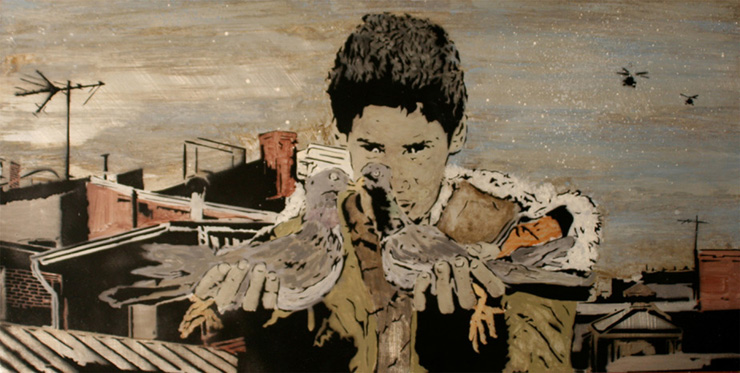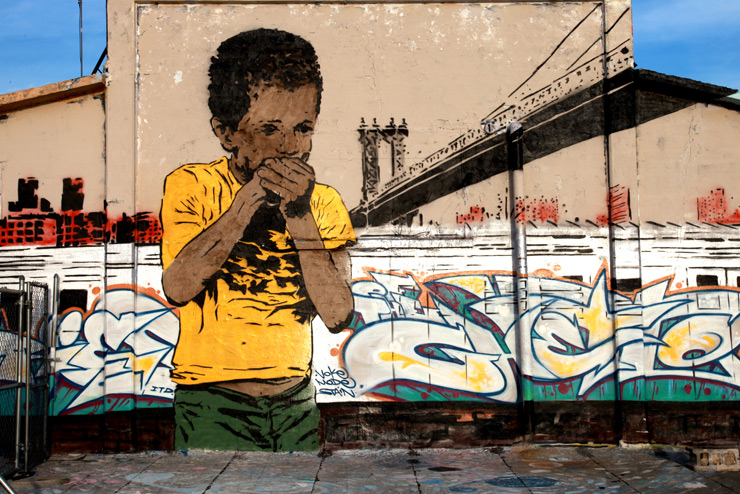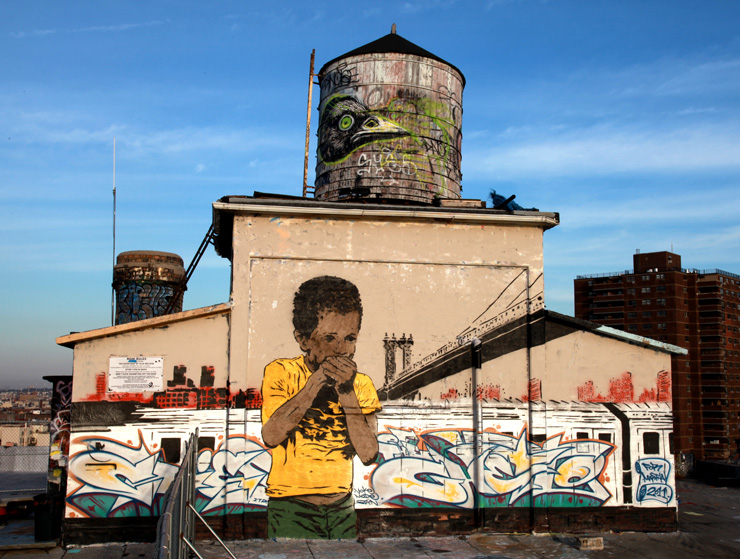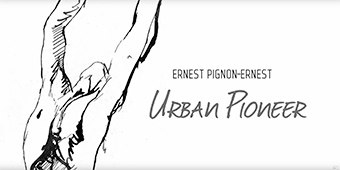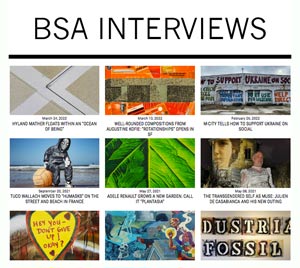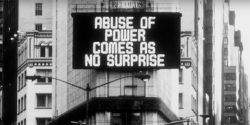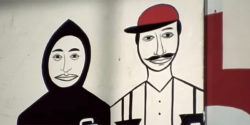More pictures and an interview here with Martha Cooper, Chris Stain, and Billy Mode about their new mural in Brooklyn and her new show next month. An inspiration to many graffiti and street artists, her photos are the basis for the Martha Cooper: Remix show at Carmichael and why she and Street Artist Aiko are wheat pasting 170 of them on a wall at the MOCA Art in the Streets exhibition opening the following Saturday.
When we were thinking of Martha’s work and and the concept of remix, it easily tapped into the span of her career; both the hip-hop analog dj technique of vinyl sampling as well as the digital cut-and-paste practice of modern mashup artists who are running the streets at the moment. While it is true that Ms. Cooper has captured a vast archive of history, it’s the high regard she has earned and the relationships she has engendered that are the reason that many of these Remix pieces are so powerful. An ethnographer by training and one of the most important photographers of street and street art culture for the last four decades, Ms. Cooper remains amazingly approachable and outright enthused about her photographs and the people in them, as if she had snapped them just yesterday. And she’s pleased to meet you.
Brooklyn Street Art: Of course the city has changed a lot in the last 35 years, and you probably have also. Can you share some insight with us about what the city was like for young photographers at that time?
Martha Cooper: I first came to NY in 1975 and for me the city was a place of opportunity. Although it was the center of publishing at the time, there weren’t that many photographers. You could call up an editor and he (usually he) would pick up the phone. I loved roaming around neighborhoods looking for pictures. Graffiti was very much underground and few people even realized that what kids were writing on walls and trains was their name. My fascination with graffiti and b-boying grew out of photographing the unknown, of being allowed entry into a world that most adults didn’t know existed. The city was going bankrupt, very few security systems were in place, and both photographers and graffiti writers could get away with a lot.
This original photo taken on Houston Street in NYC in 1978 from which Chris Stain borrowed the boy on the right. (photo courtesy of Ms. Cooper © Martha Cooper)
Brooklyn Street Art: You used to get up before dawn to catch a picture of a train, and sometimes wait 5 hours for the right shot. How did you pass the time when you had to wait for hours? Crossword puzzles?
Martha Cooper: There was no down time. Trains were constantly going by in both directions. I had to stay alert watching for just the right painted car. All of the trains in my photos were moving.
Brooklyn Street Art: So how did you get this idea for the theme for the show?
Martha Cooper: From you! (laughs) Over the years I’ve seen a lot of people using my photographs, authorized and unauthorized. The Carmichaels had asked me to do a solo show. After considering a number of options, I thought about what we had done, what you had done in that blog post. We talked about how artists had used my work and I thought, ‘Why don’t I do that?’ So that’s how it happened.
Brooklyn Street Art: Way before this show, Street Artists like Chris Stain and Shepard Fairey interpreted a number of your photographs in their work.
Martha Cooper: Some photographers don’t want their photos to be used as a basis for someone else’s art but mostly I don’t mind. Both Chris and Shepard asked permission and in both cases the collaboration has had unexpected positive results, one of which was connecting with BSA.
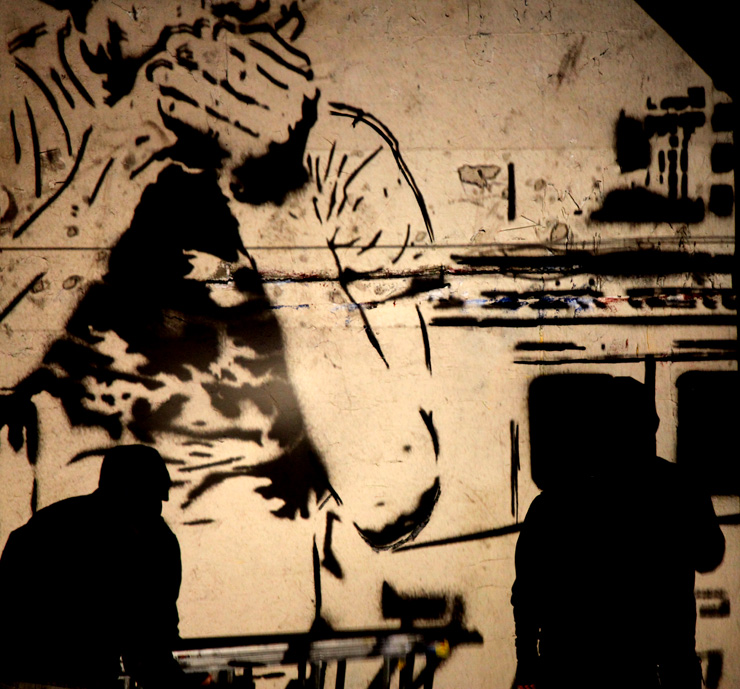 Chris Stain and Billy Mode (photo © Jaime Rojo)
Chris Stain and Billy Mode (photo © Jaime Rojo)
Brooklyn Street Art: And what have the responses been like so far?
Martha Cooper: I got a lot of really heart-warming responses from people I’ve been in touch with over the years. A lot of old-school and new-school artists and that made me feel good.
Brooklyn Street Art: Was it surprising to see the response?
Martha Cooper: I didn’t know what kind of response I was going to get. It was a little scary to write to people. I decided right in the beginning that I was going to write personal notes to everybody. So you guys and I talked about it and we made a list.
Chris Stain and Billy Mode (photo © Jaime Rojo)
Brooklyn Street Art: Well, we tried to include old-school people you were very familiar with and a number of the new people that we were familiar with.
Martha Cooper: Yes, many of whom I had met. As it turns out, Miami was really a hotbed of street artists for me in the two years I went down there to shoot at Wynwood during Art Basel. And I would not have known some of them had it not been for Basel, so I have to thank Tony Goldman for that.
Chris Stain and Billy Mode (photo © Jaime Rojo)
Brooklyn Street Art: We’ve worked with Chris Stain before and we’ve been talking to him about doing another wall together. When we told him about this show he said “Why don’t I do a Martha piece?”
Martha Cooper: I didn’t know who Chris Stain was. He contacted me a couple of years ago by email and just said that he had done work using my photographs. And a little dialogue developed and I went over to his studio in Brooklyn and I met him and it all worked out. He had already seen my books – he doesn’t take the exact picture, he takes parts of it.
Brooklyn Street Art: Yeah, he takes elements from your photographs and puts them in a different context. And that’s okay with you, it doesn’t offend you that he takes a portion of it?
Martha Cooper: No! It flatters me. You know, just the idea that people are looking at these pictures and liking them enough to base their own art on them, to me is flattering. Maybe not to everybody, but to me, I like it. Especially if you asked permission and at least you are acknowledging that you are borrowing work from me. Then it is fine.
Chris and Bill take a break from the cold winds to talk about the piece (photo © Jaime Rojo)
Brooklyn Street Art: So tell me about this piece and the boy in the picture. Do you remember when you first saw that picture?
Chris Stain: The first time I saw that picture was in Martha’s book, “Street Play” because she gave me that book. The image is from her photograph. I had been working from other images of hers and I felt bad working from all these photographers work. I thought, “Maybe I should just try to contact them and seeing if it’s okay if I work from them.” Because some of this stuff was going into paintings and I’m selling them and some of them are going into the streets, which doesn’t really matter.
So she was the first photographer I contacted. I was like, “Dear Ms. Cooper, I’m a big fan of yours, have been for a long time….” I talked about Subway Art, this and that. “…and I’m making paintings from some of your photographs and I was just wondering how you felt about it.” She wrote me back and she was really into it and she was really cool with me using the images and we just kept going. She said, “I want a painting” and we met up one day and I gave her a painting and she gave me her book “New York State of Mind”. It went from there.
…..This whole wall, Billy and I did it in Miami but we’ve changed it up.
Chris Stain and Billy Mode. The second day in the late afternoon begins (photo © Jaime Rojo)
Chris Stain and Billy Mode (photo © Jaime Rojo)
Brooklyn Street Art: You did it for Wynwood? Primary Flight?
Chris: Yeah Primary Flight like three years ago. The train behind the boy says “Cries of the Ghetto” and I was told that it was originally a piece done by Dezz and Ski, and somebody else told me it was Shane. So I’m not sure who originally did it. But I’ve always liked that train a lot and I liked the words a lot so we just incorporated the whole thing together.
And tonight Bill re-did the lettering to bring it up to date a little bit and to add our own kind of twist to it and that’s what we got.
Brooklyn Street Art: So really it’s a collage of a few images.
Chris Stain: Actually it’s a collage of a photo that I took, a photo of Martha Coopers’, and I don’t know who originally photographed that “Cries of the Ghetto” train – I’m not really sure exactly who did it – whether it was Martha or Henry or somebody else but I’ve always liked it.
Chris Stain and Billy Mode (photo © Jaime Rojo)
Chris Stain and Billy Mode (photo © Jaime Rojo)
Brooklyn Street Art: But thematically it is a good way to tie together her history ..
Chris: Yeah because it has the kids, which she was always photographing, together with the graffiti aspect that she’s really well known for.
Brooklyn Street Art: And then as a technique that you use, it brings the whole into the Street Art thing that is going on today.
Chris Stain: Yeah it’s bringing it up to what people are doing with street art now.
Brooklyn Street Art: How many pieces of hers have you done?
Chris Stain: I’ve probably done six or seven, with one that’s unfinished. I’ve done the one with Lady Pink holding the spray paint cans, the one with boy taking the tire off (or putting it on, I can’t tell), the one on the roof, the “Cries of the Ghetto”.
Billy Mode: You did that one with the kid holding the dove on the roof.
Chris Stain: Yeah the kid holding up the pigeon on the roof with one hand and there’s another one with the same boy where he’s holding two pigeons close together.
A Chris Stain piece from a couple of years ago is based on a photograph by Martha Cooper (© Chris Stain)
Brooklyn Street Art: Oh yeah! Gaia is doing that one for this show!
Chris Stain: He is? Cool, that’s cool.
Brooklyn Street Art: Well he loves doing birds, and feathers, and animals.
Chris Stain: Well Gaia’s a bird brain, that kid, so it makes sense.
Chris Stain’s reference screenprint for the wall (photo © Jaime Rojo)
Billy Mode updated the letter style for this new piece. Here’s his sketch. (photo © Jaime Rojo)
Brooklyn Street Art: So Billy you changed the style of the lettering for “Cries of the Ghetto”. How would you characterize this new style?
Billy Mode: Windy style! It’s loose, I don’t know. The original style in some ways it’s fitting to the imagery in that it is classic but I kind of see the “Cries of the Ghetto” as being more victorious now. I want those letters to be more celebratory and have more energy to them. A lot of my letter styles are, not necessarily flamboyant, but they have a lot of flair, a lot of motion. I’m really just bringing in my own take on it. There’s some influence from other people’s style, and I think that’s what happens in graffiti art is you get motivated by what other people are doing.
Chris Stain and Billy Mode (photo © Jaime Rojo)
Brooklyn Street Art: Martha, your blog for 12oz Prophet is followed quite heavily. What is your favorite part about writing a blog?
Martha Cooper: My favorite part is not the writing part! For me the best thing about blogging is that I get to make use of photos immediately instead of just archiving them for possible future use as I formerly did.
Chris Stain and Billy Mode (photo © Jaime Rojo)
Brooklyn Street Art: Stickers are a really popular medium for expression on the street today and you point to Twist, Cost, and Revs as some of the first to use them. What makes stickers so interesting?
Martha Cooper: Stickers are everywhere and yet they’re invisible to the uninitiated. Keeping your eyes peeled for stickers turns a walk down any street into a treasure hunt. It’s a fun way to navigate a city.
Chris Stain and Billy Mode (photo © Jaime Rojo)
Brooklyn Street Art: After years of searching for perfect shots, what’s the Holy Grail now?
Martha Cooper: Now I’m more worried about archiving my photos than taking them. I have enough pictures to last several lifetimes but I need to be able to find and access them.
Chris Stain and Billy Mode (photo © Jaime Rojo)
Brooklyn Street Art: Your photographs of New York City youth and their art inspired the art of the next generations. What do you think is your legacy as a photographer of this pivotal period?
Martha Cooper: In the pre-digital era, culture was disseminated by newspapers, magazines and books. I was part of a small corps of mostly freelance photographers, filmmakers, and journalists who documented early hip hop. By paying attention to subjects that might have been overlooked by mainstream media, we helped start and spread the art, dance, and music movements, now called hip hop, worldwide.
Martha with her beloved 21 year old cat Pancho (photo © Jaime Rojo)
BSA…………..BSA…………..BSA……………
Martha Cooper : Remix
Featuring original photography from Martha Cooper and original remixes from Aeon, Anton van Dalen, Aiko, Barry McGee, Bio, Nicer, B-Gee, Blade, Blanco, BurningCandy Crew, Cey, Cekis, Chris Stain, Claw, Cosbe, Crash, Dabs & Myla, Daze, DEARRAINDROP, FAUST, Flying Fortress, Freedom, Fumakaka World Dominator, Futura, Gaia, How & Nosm, Jane Dickson, John Ahearn, Jose Parla, Kenny Scharf, LA II, Lady Pink, Lee Quinones, Anthony Lister, Logan Hicks, The London Police, Mark Bode, Nazzareno Stencil, Nunca, Mare, Quik, Evil Dr. Revolt, Shepard Fairey, Skewville, Subway Art History, Swoon, T-Kid, Terror161 and Victor Castillo.
Coming to Carmichael Gallery April 9.
Other Articles You May Like from BSA:
Welcome to BSA Images of the Week! Here’s our weekly interview with the street, this week featuring: Adriana Vila, Stikman, City Kitty, Raddington Falls, Miyok, Neon Savage, Vegas, Clone, Sam...
A 5-village mural program will be surely eclectic, to say the least. The first Osona Artimur Festival produced 19 of them, murals that is, and each speaks to the sensitivities of the modern era, an a...
Wall\Therapy has concluded in Rochester again, this year with a focus on portraits and today we bring you an update from some of the talented photographers on the scene in this north western New York ...
Community murals give opportunities to young and old to try their hand at self expression and go big on a wall. Here in this municipality in Catalonia, the duo called Pouvelle say, “We like to t...
It's a unique talent to capture the fervor of an opening like "Beyond the Streets" in one minute. The show spreads over two floors and fifty years - the reunions alone were enough for an hour mov...
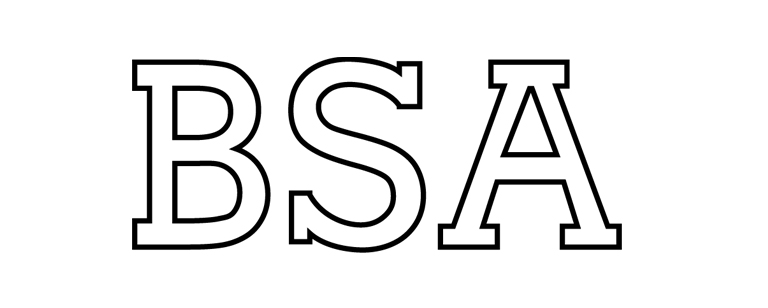 BROOKLYN STREET ART LOVES YOU MORE EVERY DAY
BROOKLYN STREET ART LOVES YOU MORE EVERY DAY


